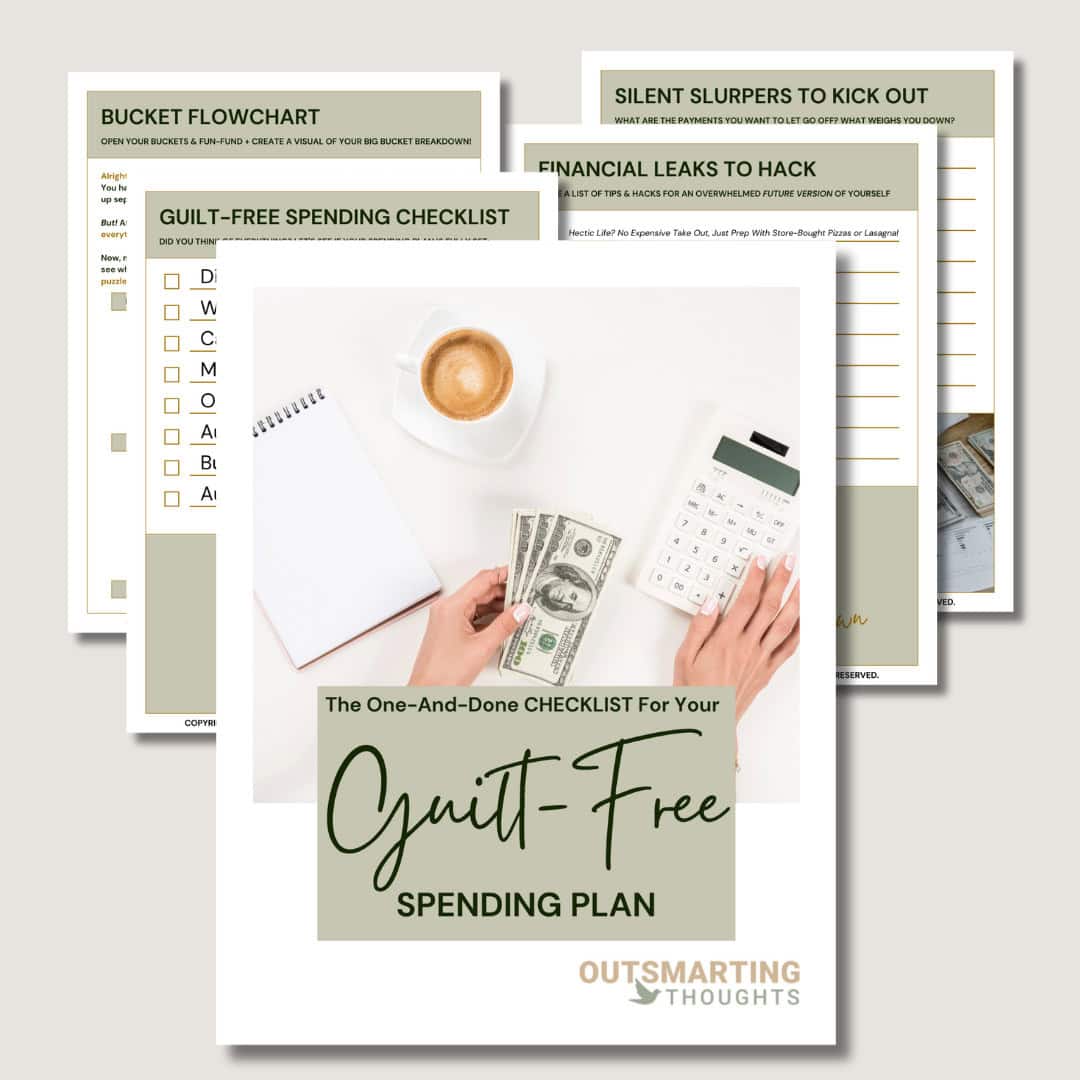Wanna know what is a danger of overspending that almost no one talks about, but every overthinker feels in their bones? This post is dedicated to showing you the invisible cost of overspending: not just the money lost, but the power. The confidence. And worst of all, the control.
Overspending doesn’t always look like chaos. Sometimes it looks like working your ass off and still falling behind somehow. Sometimes it looks like buying yourself little rewards to stay sane. And sometimes, it looks like an actual trainwreck driving you into despair and depression. If you’ve ever told yourself ‘I’ll deal with it later’ while secretly panicking, you’re not alone, and you’re not broken! You’re managing stress the only way you know how. But that’s about to change!
What you’re going to learn is the real danger behind overspending: how it spirals, how it isolates, and how it tricks you into thinking it’s not that bad; until it is. We’ll unpack how society misjudges overspenders, how financial denial works like a sedative, and how staying stuck robs you of your power & freedom. Most importantly, we’re going to try to convince you, that you’re not bad with money, but kept in the dark for a reason.
After you have learned to name what’s actually happening beneath your spending habits, you’ll be able to shift away from avoidance and gravitate towards strategy. You’ll stop feeling like your money is this overwhelming mess and start making it work for you: with clarity & intention, not with guilt and shame. That’s how you build real self-trust.
This post is all about what is a danger of overspending, so you can stop falling prey to systematic powerlessness and finally take back control over your financial life.
What Is A Danger Of Overspending
Overspending isn’t the danger most people think it is. Sure, you lost money. But the real risk? Denial! When you’re stuck in survival mode, chaos feels safer than a clear strategy. And overspending, while easy to judge, is often one of the few coping mechanisms that actually works when everything else feels like too much.
That’s what makes it so dangerous. It works well enough to keep the truth at bay. You end up stuck in a brain fog of missed bills, avoidance, and the low-grade panic of knowing something feels unsafe. Then the shame sets in, and the overidentification of failing and ‘being bad with money’ makes it even harder to get out.
But this isn’t about drama or drastic changes. It’s about reclaiming control over your financial life with a strategy or system that actually fits YOU. No guilt, no identifying with ‘being bad with money’. Just smart, quiet control. This post is your invitation to stop beating yourself up, and start outsmarting the problem instead.
‘It’s Just A Phase’… Until It Isn’t.
Overspending rarely starts as a crisis. More often, it slips in quietly: an out-of-proportion treat after a long day, a stress-fueled swipe, or a ‘this month only’ indulgence. You tell yourself you’ll make up for it later, and sometimes you even do. But when life doesn’t slow down, that promise gets pushed back again and again.
And that’s when the real danger kicks in. Because what started as a coping mechanism becomes habit. And then, a lifestyle. Financial erosion doesn’t actually come from one massive mistake. Instead, it comes from all the small leaks that never get patched. It’s the slow drip that empties the tank!
Overachievers are especially prone to this. When you’re chasing both productivity and perfection, checking in on your bank balance can feel like a waste of time. You focus on getting things done, and hope your finances sort themselves out in the background. But they don’t! And the longer this financial denial keeps winning from your wallet, the harder it gets to clean up.
RELATED POST:
How To Pull Yourself Out Of Financial Denial: An Overachiever’s Strategy To Get Back In Control
This isn’t about being judgmental or reckless. It’s truly about being overwhelmed. It’s about not having the willpower to pause, plan, and pivot. So, what is a danger of overspending? The longer you’re stuck in the hamster wheel of living paycheck to paycheck, the more you bleed safety and stability without realizing it. Overspending isn’t dangerous because it’s dramatic. It’s dangerous because it’s subtle. Until it isn’t.
Being Misjudged Hurts Harder Than Being Broke
What nobody warns you about? Overspending carries a HEAVY STIGMA. People assume it’s about being lazy, careless or even shallow. They turn it into a joke, especially when women do it. But the truth? Overspending is often a triggered stress response. A nervous system hijack to cope with the turbulence, the exhaustion, and the unmet needs the only way it knows how.
And here’s a real sad danger: not just being judged by others, but even judging yourself. Because when you’re smart, capable, and high-functioning, the shame hits harder. You tell yourself you SHOULD know better! You minimize your struggle because it doesn’t look like rock bottom. But that internalized shame keeps you from getting help. Instead, it isolates you.
Overachievers can easily fall prey to this emotional spiral. You feel like a fraud for struggling with money. Like you don’t have the right to be overwhelmed? So, you hide it. And that hiding leads to staying stuck in the dirt. Because you can’t change what you’re too ashamed to admit!
This isn’t just about money anymore. This is about identity. When you believe overspending is an actual moral failure, every financial misstep feels like proof you’re not who you say you are. That’s the trap. And the only way out is compassion for your mistakes. Not pity. Not sugarcoating. And most certainly not denial! But a kind of deep, strategic self-respect that says: ‘I’m allowed to struggle & make mistakes, but it’s my responsibility to get back in control. And I’m allowed to get smarter about it & get back in control of my financial life! I deserve the safety!’
Owning a cashflow strategy is a skill that’ll give you some serious advantages in life. I think budgeting is an aligned action with taking life seriously, and I seriously believe life will reward you for it. If you’re not into high-maintenance strategies like ‘tracking your spending’ and just want to sit down ONCE to direct your financial future, our Guilt-Free Spending Plan Printable is the right cashflow strategy for you! Don’t let anybody outsmart you out of your own money and start budgeting today by simply filling out the form below:

Want a free
ONE-AND-DONE CHECKLIST for aGUILT-FREE SPENDING PLAN? Free up your bandwidth and stop overthinking with this
FREE One-And-Done Checklist for your Guilt-Free Spending Plan!
Simply fill out the form below to get this strategy
delivered straight to your inbox!
Financial Denial Creates A False Sense Of Safety
Let’s be real here: financial denial feels way safer than facing the facts. When you’re envelope is waiting for you in the drawer, you can still enjoy the Schrodinger cats possibility of ‘it’s all fine’, right?
Denial numbs your urgency. It gives you reasons to delay decisions, ignore the truth, and avoid dealing with what’s really happening. But underneath that fog? Damage is quietly stacking up. One surprise bill, one skipped paycheck, and suddenly you’re in a tailspin, being the ‘irresponsible bad adult’.
If you’re someone who always pushes through, who holds everything together when it’s falling apart (yes, you! You beautiful overachiever), this hits so hard! You’ve probably told yourself it’s fine. That you can still manage. You’ve powered through before. But that same resilience can become the reason you stay in the dark!
RELATED POST:
Psychological Reasons For Overspending & How To Outsmart Them (Spoiler Alert: It’s Not YOUR Fault!)
The danger isn’t just the money you lose. It’s the illusion of control that keeps you away from taking the right action! Every unopened banking app, every ‘later’ turns into a widening gap between you and the safe stability you need to thrive towards your goals & achievements.
You’re really trading short-term comfort for long-term peace, freedom & autonomy. And trust me, that trade isn’t worth it anymore. The second you start calling it out for what it is, you can start taking steps to take your power back. Denial only feels safe. But building an actual strategy that works for your life? That’s where REAL safety starts.
Letting Go Of Your ‘Bad With Money’ Identity: Time To Regain Control
Let’s set the record straight: financial control is not about frugal rigidity or being perfect. It’s way more about being in charge of the money YOU EARNED. For that, you only need two things!
Start by stating where you want to go. What is it you desire? Make that bucket list! What would financial safety actually look like for you? What would make you feel calm when you open your banking app? Because for most people, $500 or $1000 in savings is already enough for a way calmer nervous system. So determine for yourself, what would take the pressure off for you? Make that your North Star.
When you know what you’re safety net & budgeting goals are, you only need to level up in one more department. Pick a budgeting strategy that works with your brain, lifestyle & personality. We cover some more low-maintenance strategies in this post: 7 No-Bullshit Budgeting Strategies That Let You Spend Guilt-Free While Still Saving Big. It doesn’t matter what strategy it is, as long as it’s tailored to you.
If you’ve ever said ‘I’m just bad with money’, I need you to consider this: you’re really not. You’ve just been stuck using tools that weren’t designed for how you work. It really isn’t your fault. But staying stuck? That’s not a safe space to stay in.
You’re capable of building a system that works with you, not against you. One that gives you breathing room. One that proves you’re not a financial mess. You’re just an overthinker & overachiever in need of better tools. This is your moment. Not to fix everything overnight (you overachiever). Just take a moment, and see, where you can stop leaking energy. Start leading yourself again.
What Is A Danger Of Overspending (Summary)
The danger of overspending isn’t just about money. It’s the spiral that sneaks in. The silence that isolates you. The brain fog that makes you forget that you actually have options. What keeps you stuck isn’t your spending. It’s the shame and disbelief that you’re the problem.
Overspending is just a coping mechanism. A way you’ve been surviving. That doesn’t make you weak. It makes you human. But it’s not you, it’s your environment! You’ve been doing your best with tool that don’t really fit. But you have another chance for changing that now!
So here’s your move: define what feelings safe with money looks like. Make a bucket list & turn your desires into budgeting goals. Then grab a budgeting system that aligns with YOU, not one that burns you out. You don’t have to be perfect, you just have to be strategic.
You haven’t screwed this up beyond repair. You’re not behind. You’re just ready to do it differently. And that makes you very powerful. This is where your strategy starts!
This post was all about what is a danger of overspending, so you can stop falling prey to systematic powerlessness and finally take back control over your financial life.
We aim to help you out as much as possible, but please keep in mind that the content is only for general informational and educational purposes. We offer our services based on independent research and life-experience only, and so our strategies can never serve as a substitute for professional advice. Trust me, we do not have 'everything figured out', are all still huge works in progress, but hey, what works for us, might work for you too! This is allll up for you to decide... It might not work for you, and that's okay, so cherrypick the stuff that resonates and leave the stuff that doesn't, and let's go!








